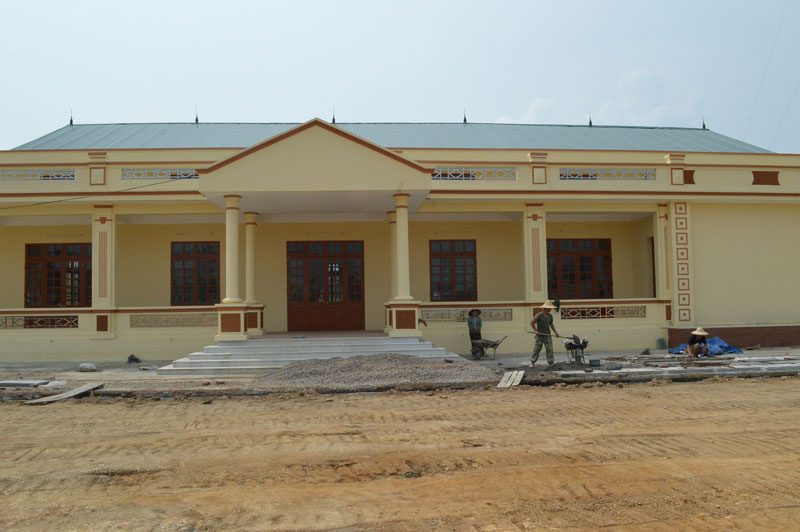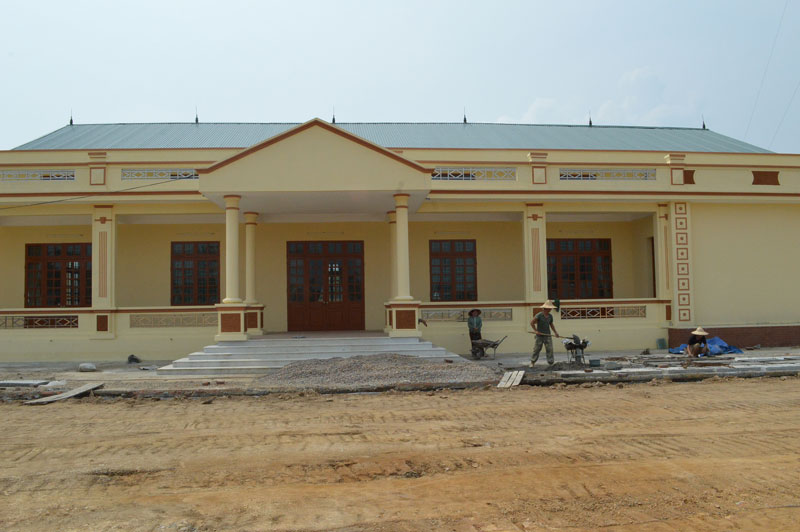
(HBO) – On these days, the construction of the cultural and sports center of Tan Vinh Commune (Luong Son) is in the finishing stage. The cultural house with capacity of 150 seats has been built. The entrance and the floating stage are under construction.

The cultural works of Tan Vinh Commune (Luong
Son) are in the finishing stage, meeting the new rural area criteria.
In 3 years (2014 - 2016), the system of
cultural facilities of Nhuan Trach commune was built and financed by various
sources of capital. In particular, the commune cultural house of 600 m2, with
the capacity of over 300 seats was invested 4.5 billion VND from the integrated
capital of the district. The commune stadium is 9,000 square meters in size and
was invested 1.7 billion VND from the government bond and the district budget.
In 2016, the sports center serving children and elderly people was built with
the provincial reward fund. In addition, with the motto of the State and people
working together, from the capital to build new rural area, the commune budget,
the local people contribute, the enterprises support, there have been mobilized
over 644 million VND to build new, upgrade and repair culture houses and sport
fields in villages and hamlets to meet the standards as prescribed, meeting the
needs of community activities of the people.
Ms. Nguyen Thi Thu Hang, the Head of District
Culture and Communication Board, said that: Up to now, 13 out of 19 communes in
the district have reached the criteria of cultural facilities. The remaining
communes did not meet the criteria, mainly due to budget constraints. This is
one of the difficult criteria of the district in implementing new rural area.
Through the study and implementation of the
criteria, the communes in the district have reserved land, planned the center
cultural and sports center areas to ensure the area according to regulations.
Along with the public land area of the commune, the people voluntarily donate
land to serve the construction work. However, the construction investment
sources are large, mainly depended on the invested capital in the program and
district budget, so the communes can not take the initiative by themselves. The
investment can not be concentrated at a time so it must be dilated every year,
prioritizing investment in the communes planning to achieve the target of new
rural area.
In addition, there are 178 out of 184 village
culture houses, reaching 96.7%.
With an increasingly vibrant and widespread emulation movement aimed at building cultured residential areas and cultured families, Yen Thuy District has been making steady progress toward improving both the material and spiritual well-being of its people, while fostering a civilized, prosperous, beautiful, and progressive community.
Once lacking recreational spaces and community facilities, Residential Group 2 in Quynh Lam Ward (Hoa Binh City) has recently received attention for the construction of a new, spacious, and fully equipped cultural house. The project followed the model of state support combined with public contributions in both labor and funding.
The "All people unite to build cultural life" movement, which has been effectively integrated with Kim Boi district’s socio-economic development goals, is fostering a lively spirit of emulation across local residential areas, hamlets, villages, public agencies, and enterprises. In addition, through the initiative, traditional cultural values are being preserved and promoted, while community solidarity and mutual support in poverty reduction and economic development are being strengthened.
A working delegation of the Hoa Binh provincial People’s Committee led by its Permanent Vice Chairman Nguyen Van Toan on June 11 inspected the progress of a project to build the Mo Muong Cultural Heritage Conservation Space linked to tourism services in Hop Phong commune, Cao Phong district.
Born and growing in the heroic land of Muong Dong, Dinh Thi Kieu Dung, a resident in Bo town of Kim Boi district, in her childhood was nurtured by the sweet lullabies of her grandmother and mother. These melodies deeply imprinted on her soul, becoming an inseparable part of her love for her ethnic group's culture. For over 20 years, this love for her hometown has driven Dung to research, collect, and pass down the cultural values of the Muong people to future generations.
In the final days of May, the Ethnic Art Troupe of Hoa Binh Province organized performances to serve the people in remote, mountainous, and particularly disadvantaged areas within the province. These were not just ordinary artistic shows, but they were the meaningful journeys aimed at spreading cultural values, enhancing the spiritual life of the people and contributing to the preservation of ethnic minority cultural identities.



